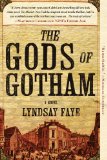Summary | Excerpt | Reading Guide | Reviews | Beyond the Book | Readalikes | Genres & Themes | Author Bio

A Novel
by Lyndsay Faye
I wasn't musing over stray kids the night of August twenty-first, though. I was crossing Elizabeth Street, posture about as stalwart as a bag of sand. Half an hour before, I'd taken my copper star off in disgust and thrown it against a wall. By that point, however, it was shoved in my pocket, digging painfully into my fingers along with my house key, and I was cursing my brother's name in a soothing inner prayer. Feeling angry is far and away easier for me than feeling lost.
God damn Valentine Wilde, I was repeating, and God damn every bright idea in his goddamned head.
Then the girl slammed into me unseeing, aimless as a torn piece of paper on the wind.
I caught her by the arms. Her dry, flitting eyes shone out pale grey even in the smoke-sullied moonlight, like shards of a gargoyle's wing knocked from a church tower. She had an unforgettable face, square as a picture frame, with somber swollen lips and a perfect snub nose. There was a splash of faint freckles across the tops of her shoulders, and she lacked height for a ten-year-old, though she carried herself so fluid that she can seem taller in memory than in person.
But the only thing I noticed clearly when she stumbled to a halt against my legs as I stood in front of my house that night was how very thoroughly she was covered in blood.
Chapter 2
To the first of June, seven thousand emigrants had arrived... and the government agent there had received notice that 55,000 had contracted for passage during the season, and nearly all from Ireland. The number expected to come to Canada and the States is estimated by some as high as 100,000. The rest of Europe will probably send to the States 75,000 more.
• New York Herald, summer 1845 •
Becoming a policeman of the Sixth Ward of the city of New York was an unwelcome surprise to me.
It's not the work I imagined myself doing at twenty-seven, but then again I'd bet all the other police would tell it the same, since three months ago this job didn't exist. We're a new-hatched operation. I suppose I'd better say first how I came to need employment, three months back, in the summer of 1845, though it's a pretty hard push to talk about that. The memory fights for top billing as my ugliest. I'll do my best.
On July eighteenth, I was tending bar at Nick's Oyster Cellar, as I'd done since I was all of seventeen years old. Th e squared-off beam of light coming through the door at the top of the steps was searing the dirt into the planked floor. I like July, the way its particular blue had spread over the world when I'd worked on a ferryboat to Staten Island at age twelve, for instance, head back and mouth full of fresh salt breeze. But 1845 was a bad summer. The air was yeasty and wet as a bread oven by eleven in the morning, and you could taste the smell of it at the back of your throat. I was fighting not to notice the mix of fever sweat and the deceased cart horse half pushed into the alley round the corner, as the beast seemed by degrees to be getting deader. There are meant to be garbage collectors in New York, but they're a myth. My copy of the Herald lay open, already read back to front as is my morning habit, smugly announcing that the mercury was at ninety-six and several more laborers had unfortunately died of heatstroke. It was all steadily ruining my opinion of July. I couldn't afford to let my mood sour, though. Not on that day.
Mercy Underhill, I was sure of it, was about to visit my bar. She hadn't done so for four days, and in our unspoken pattern that was a record, and I needed to talk to her. Or at least try. I'd recently decided that adoring her was no longer going to stand in my way.
Nick's was laid out in the usual fashion for such places, and I loved its perfect typicalness: a very long stretch of bar, wide enough for the pewter oyster platters and the dozens of beer tumblers and the glasses of whiskey or gin. Dim as a cave, being half underground. But on mornings like that one the sun cut through wonderfully, so we didn't yet need the yellow-papered oil lamps that sent friendly smoke marks up the plaster. No furniture, just a series of booths with bare benches lining the walls, curtained if you wanted although no one ever closed them. Nick's wasn't a place for secrets. It was a forum for the frantic young bulls and bears to scream things across the room after a twelve-hour stint at the Exchange, while I listened.
Excerpted from The Gods of Gotham by Lyndsay Faye. Copyright © 2012 by Lyndsay Faye. Excerpted by permission of Amy Einhorn Books. All rights reserved. No part of this excerpt may be reproduced or reprinted without permission in writing from the publisher.




We should have a great fewer disputes in the world if words were taken for what they are
Click Here to find out who said this, as well as discovering other famous literary quotes!
Your guide toexceptional books
BookBrowse seeks out and recommends the best in contemporary fiction and nonfiction—books that not only engage and entertain but also deepen our understanding of ourselves and the world around us.